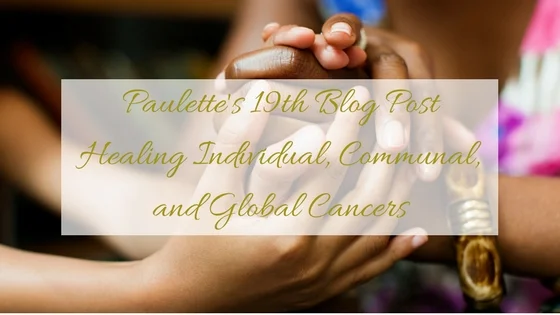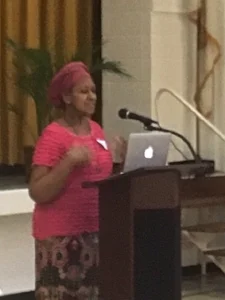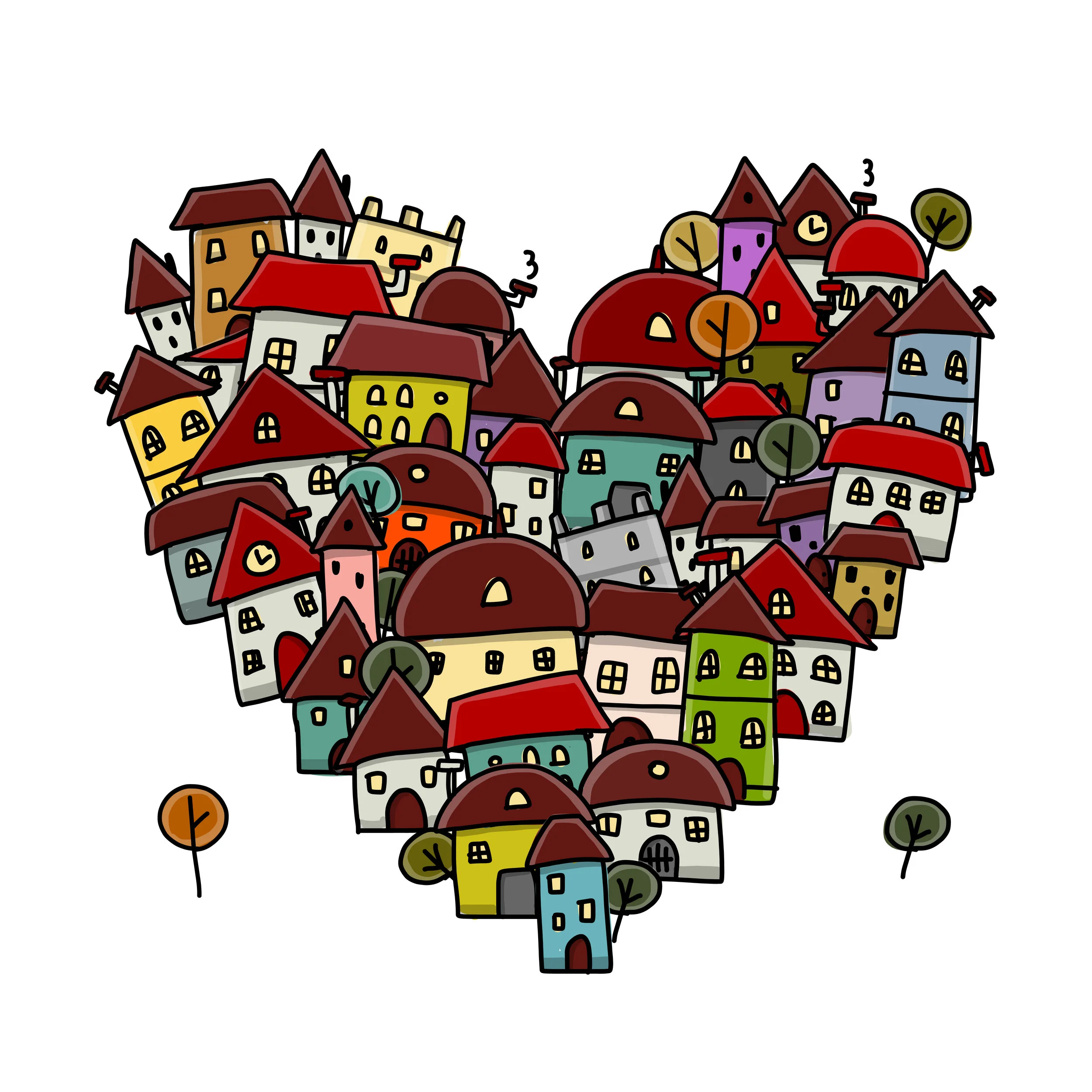A few weeks ago, I was the keynote speaker at the Women for Healing and Networking Dinner and Forum at the Congregational Church of Manhasset, on Long Island. The founders of the group are my friend Lesley Mazzotta, a certified Spiritual Director and Educator, and Dr. Isma Chaudry, a Physician and the first female President of the Islamic Center of Long Island. I was inspired and empowered by the gathering. Below, are some of the highlights from my keynote address. I would love to hear your feedback.
Women for Healing and Networking assembles women of various faith traditions to help us find unity. I spoke to the group about healing the various cancers in our lives. I compared my cancer healing journey to the different cancers we find in locally and globally, noting that the traditional ways we have been treating physical cancer have worked at the superficial level for decades but do not get to the root of the disease, and thus often recur. The same applies to the cancers in our society. We’ve been talking about some of the same societal diseases for a long time – such as racism and sexism - and pretending that we’re making advances by treating them in the same traditional ways when the truth is we are not progressing. If we are committed to healing our society, we need to move beyond our traditional remedies; they do not work.
When we talk about healing in our society, comparing it to healing from cancer is apropos for many reasons. Cancer can take many forms. Biologically, cancer is a disease caused by an uncontrolled division of abnormal cells in a part of the body. But what is cancer from a non-biological, or societal perspective? Societally, cancer is a practice or phenomenon perceived to be evil or destructive, and hard to contain or eradicate. Examples of societal cancer are racism, sexism, discrimination, sex trafficking, supremacy, terrorism, unequal access to health care, gender bias, political corruption, greed, pedophilia, gun violence, and the list can go on and on. These cancers appear to be more evident than ever in our current society, and they manifest as unchecked evil. They plague us to the core.
Now that we have identified the cancer, we must treat it. Treatment is easier said than done. From a physical point of view, there are standard treatments for cancer like surgery, chemotherapy, radiation, and oral medications. Hundreds of thousands of people undergo this type of treatment for cancer in any given year. I’m sure that all of us know at least three people besides me who have been diagnosed with and treated for cancer. In the conventional medical model, we treat the manifestation of cancer, meaning the symptoms. Conventional cancer treatment does not address the cause of why cells start to grow unchecked in one’s body in the first place. We have to address the cause because cancer cells grow in everyone’s body every day. In the normal cell cycle, cells are born and die. A healthy and functional immune system identifies and kills cancer cells so the disease does not develop in your body.
In those of us who develop cancer, our immune systems for unknown reasons are not able to identify the cancer cells and destroy them, so they grow unchecked, causing cancer to develop. Typically, cancer treatment aims to cut out the cancer through surgery, or burn it off through radiation, or shrink it by infusing it with toxic chemicals known as chemotherapy. Chemotherapy doesn’t know the difference between healthy cells and cancer cells. That’s why people get so many side effects from chemotherapy – the drugs attack all fast-growing cells – those in your digestive system cells, hair, etc.
How is the information above related to cancer in society? When we identify abnormal or detrimental behavior in society, what are the typical treatments that are prescribed? Wars and mass incarceration immediately come to my mind. These are both examples of treating the symptom, not the cause. In wars, people die, from children to innocent civilians to soldiers. When people are jailed, the lives of their family members and close friends end too. War and mass incarceration might treat a symptom, but they fail to address causes. When we see our societal ailments, we need to get to the root of the problem instead of just treating symptoms. We need healthy, productive ways to handle our deep hurts.
We must be healed as individuals before we can heal the world. We must do the challenging work of genuine self-reflection. It is time for us to move beyond tolerance. We must embrace our neighbors, regardless of what they look like, where they come from, what jobs they hold, what political beliefs they hold, what religion they practice, and who they choose to love. I know that this is not an easy charge, but my friends, when we take an honest look at the insidious cancers that are destroying our society, we cannot help but acknowledge that it’s high time for a change.
The task before us is immense. How do we integrate conventional and progressive treatments for what ails our society? How do we combine the best of what has worked in the past but throw out what no longer works, and embrace a new thing? In The Bible, the book of Isaiah chapter 43:19 tells us “Behold, I am doing a new thing! Now it springs forth; do you not perceive it? I am making a way in the wilderness and streams in the wasteland.” Wilderness and wasteland are all around us; we are walking through the muck and mire daily, and many of us are stuck in it.
The time is now to get progressive and innovative about addressing and healing the cancers in our societies. The time is now to stop using toxic and violent methods to eradicate people and beliefs that we think don't serve us. The time is now to lift up peace, understanding, curiosity, hope, and vision for a brand-new world – a world where we all can live together as one. The traditional motto of these so-called United States, adopted by Congress in 1782 is e pluribus unum, which means “out of many, one.” In today’s increasingly globalized world, this motto needs to be adopted by all countries as we seek to work, live and prosper together for the good of every citizen on God’s earth. One translation of Psalm 24: 1 is as follows: “The earth and everything in it, the world and all its inhabitants, belong to the Lord.” Combining the motto of the United States with the spirit of this scripture verse is a helpful starting point to help us envision the kind of world we are called to create for ourselves and our future generations of children.
Every great world religion has its own version of what is known as the Golden Rule: “Do unto others as you would have them do unto you.” We share one planet; we are all neighbors. Loving each other is a divine command. Let’s do our best to live it out each day of lives in all that we think, say and do. There is no room in this world for cancer, only health. What will you do to make it happen? If you feel inclined to do so, drop me a line and let me know. Let’s keep working together to make this world a better place. The future of our planet depends on it. See you next week. The journey continues.


